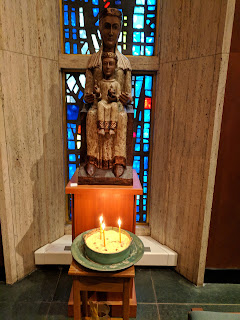
Rev. Molly F. James, PhD
DFMS Noonday Prayer via Zoom
June 30, 2020
Psalm 5; Amos 3:1-8, 4:11-12; Matthew 8:23-27
May God’s Word be spoken. May God’s Word be heard. May that point us to the living Word who is Jesus Christ our Lord. Amen.
Today we get the story of Jesus stilling the storm. Ah wouldn’t that be wonderful? If we could just tap Jesus on the shoulder and say, um Jesus, could you maybe do something about the multiple storms that are brewing in our world and our nation right now? Could you just snap your fingers and have the virus be gone, racist structures transformed and our economic realities stabilized? That would be great. Thanks.
If only things worked like that. If only. In the midst of the current challenges - in the midst of rising infection rates and in the midst of the ways issues of systemic injustice have been brought to the fore and the ways society and our economy have been so deeply affected by all that is going on in the world - it is easy to wish for a quick solution to our problems. Easy to wish that we could just push a button or flip a switch and have everything be transformed. We know that is not possible. What is happening in our world right now is far more complex than a simple windstorm on a lake.
So, I think we have a choice. We can either get stuck in the place of wishing things were different, wishing for some kind of magical solution to the problem. Or we can focus on what Jesus said to the disciples in the midst of the storm. He told them to be not afraid and to have faith.
What does that look like for us? What do we hold on to in the midst of times when we may feel fear, anxiety, uncertainty?
A favorite prayer in the Compline service reminds us as those who may be wearied by the changes and chances of this world to put our trust in God’s eternal changelessness. That is where we find our hope, our grounding, our rock. In God. It is in a deepening of our relationship with God, a deepening of our connection to God that we find peace and stillness. We can be like Jesus - at peace, at rest - even when there is a storm swirling around us.
So, today’s Gospel is a reminder to us that our call as a people of faith is to stay grounded and connected to God in the midst of the storms of life. We are never alone in those storms, even if we might feel that way. As we pray at the end of our morning prayer service, Christ is protecting us through the storms. Note it does not say that Christ is preventing the storms or stilling them immediately for us. That prayer reminds us that Christ is with us and protecting us through the storms.
The invitation then is for us to be attentive to what it is in our lives that help us stay grounded and connected to God. How can we remind ourselves of the all important truth that Christ is with us in the midst of the storms of life?
I imagine this might look a little different for each of us. And I would guess we have some elements in common. I would guess that we all share a gratitude for this Chapel community, this faithful group of colleagues who pray together to keep us grounded in the midst of things. No doubt all of us have personal prayer practices and other worshipping communities as well. And we have people - beloved friends and family members, and possibly also some professionals like a spiritual director and/or a therapist - all of whom bring their own particular gifts to help us stay grounded and connected to God. So often we can hear God’s Word or feel God’s presence best through the words and presence of another person.
And as I have mentioned before, I also believe that how we care for our physical selves is a part of keeping us grounded in our faith. Eating well, drinking enough water, getting enough sleep and exercise, being sure we take time off. All of those things help too.
I hope some of these practices resonate with you. I hope that today you are reminded to continue that practices that have served you well in the past, and possibly invited to pick up a new one to help carry you through this week or whatever storms lie ahead. Do not fear. Keep the faith. God is with us.
AMEN.



